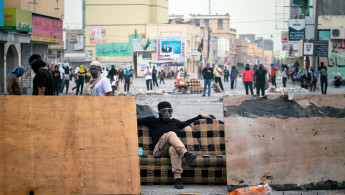Bahrain police fire tear gas as protests mark uprising
Amnesty International urged Bahrain to "rein in" its security forces and "seize the opportunity of the fourth anniversary of the uprising to announce genuine and long overdue reforms".
Police deployed heavily as men and women carrying Bahrain's red and white flag alongside portraits of detained activists chanted "Down Hamad", referring to the country's king.
| There looks like little hope of progress in Bahrain. The opposition is barely legal - Neil Partrick, analyst |
Protesters burned tyres and blocked roads.
The police fired tear gas and sound bombs after boosting security around several villages and along major roads to prevent protesters advancing towards central Manama, witnesses said.
The opposition said on Twitter that the police also fired buckshot, and posted pictures of wounded protesters, saying several activists were arrested.
The main opposition bloc al-Wefaq in a statement issued in English urged protesters "to stick to the non-violent movement and... refrain from putting lives and private and public properties under threat".
"The calls for violence acts do not relate to the Bahraini people’s peaceful movement for democracy," it said, condemning "the excessive use of force by security forces and which has resulted in serious casualties among the peaceful citizens".
It gave a toll of 13 people wounded.
Bahrain's Saudi-backed Sunni authorities crushed protests led by its majority Shia shortly after they erupted on 14 February, 2011, taking their cue from Arab Spring uprisings elsewhere.
Stern warning
The radical February 14 Coalition, a cyber youth group, had called for demonstrations and strikes across the kingdom to mark the anniversary.
But the public security chief, Major-General Tariq al-Hassan, issued a stern warning against any protests.
"Action will be taken against those who spread terror among citizens or residents, put the safety of others at risk or try to disrupt the nation's security and stability," he said.
Amnesty said in a statement that "fundamental freedoms have increasingly been curtailed" in Bahrain.
The London-based rights watchdog urged the kingdom to release detained activists, allow demonstrations and "hold to account all those responsible for human rights abuses".
Bahrain, home to the US Fifth Fleet, sits across the Gulf from Shia-dominated Iran.
It is also one of several Arab states that back US-led air strikes against the Islamic State group (IS, formerly Isis) in Iraq and Syria, making it a vital Western ally.
The sectarian divide is deepening in Bahrain with a growing gap between the Sunni minority government and its mainly Shia opponents.
The opposition is demanding a "real" constitutional monarchy with an elected prime minister independent of the ruling royal family, but the Khalifa dynasty has refused to yield.
Al-Wefaq leader Sheikh Ali Salman has been behind bars since 28 December for allegedly trying to overthrow the regime.
Citizenships revoked
Attacks targeting the security forces have increased.
"The movement has reached its four years with the situation only getting worse and deteriorating with citizens threatened by losing their nationalities any minute," al-Wefaq said.
Bahrain has revoked the citizenships of scores of activists over the past few years.
In October, a court banned al-Wefaq for three months for violating a law on associations.
"There looks like little hope of progress in Bahrain. The opposition is barely legal," said Neil Partrick, analyst at the Royal United Services Institute for Defence and Security Studies.
The political rivals have struggled to bury their differences through a "national dialogue" that fell apart despite several rounds of negotiations.
In November, the opposition boycotted parliamentary elections in which pro-government Sunnis won the most seats.
Al-Wefaq has insisted "peaceful" protests must continue "until a political solution is reached".
But a solution appears remote in the smallest Gulf Arab country, a neighbour of the absolute Sunni monarchy and regional powerhouse Saudi Arabia.
"Despite an interest in intra-Bahraini talks, the Saudi leadership seems to be allowing harder-line elements in the Bahraini ruling family to dictate the political direction of the country," said Partrick.
On Monday, Manama permanently closed Alarab News Channel whose programming was interrupted on February 1 just hours after launching and airing an interview with a Shia opponent of Bahrain's rulers.





 Follow the Middle East's top stories in English at The New Arab on Google News
Follow the Middle East's top stories in English at The New Arab on Google News
![The UAE is widely suspected of arming the RSF militia [Getty]](/sites/default/files/styles/image_330x185/public/2024-11/GettyImages-472529908.jpg?h=69f2b9d0&itok=Yauw3YTG)
![Netanyahu furiously denounced the ICC [Getty]](/sites/default/files/styles/image_330x185/public/2024-11/GettyImages-2169352575.jpg?h=199d8c1f&itok=-vRiruf5)
![Both Hamas and the Palestinian Authority welcomed the ICC arrest warrants [Getty]](/sites/default/files/styles/image_330x185/public/2024-11/GettyImages-2178351173.jpg?h=199d8c1f&itok=TV858iVg)